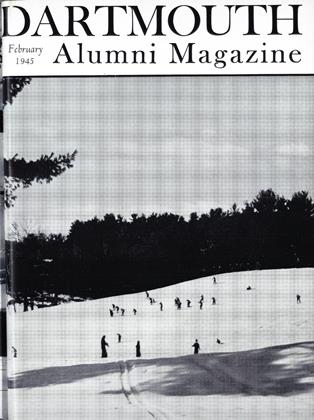ONE DEFINITION OF MAN refers to him as the animal that forms clubs. Besides being rational, Man is social—gregarious, if you prefer. He tends to crystallize into groups based on some definite nucleus of interest. It has taken form in the colleges as a tendency to combine small gatherings of students in fraternities bearing cabalistic names, usually symbolized by the letters of the Greek alphabet. The question raised by the intrusion of the war is whether this inheritance from the past can hope to endure.
Several of the older college fraternities have attained or passed their centenaries of existence. The circumstances which called them into being have greatly changed. If such groups were being formed today for the first time, it is improbable that they would be designated by Greek letters. These are days of small Latin and less Greek. But the power of tradition is still considerable; and while fathers remain alive to whom such symbols refer to something little short of sacred, their sons will be subjected to subconscious pressure to maintain the symbols, if nothing more, as a worthy inheritance from a day that, if not dead, is dying.
In the larger universities such organizations long ago took on a different form, though occasionally retaining the original designations, and became virtually local clubs. In the smaller colleges they have tended to endure as national organizations, despite an occasional outburst of undergraduate impatience with such elements as the overhead cost of this arrangement. At Dartmouth this has thus far come to nothing. What we face now is a new condition, arising from the fact that for a whole college generation traditional fraternity activities have entirely ceased, in which it is necessary to decide whether fraternity life on the old foundation shall be revived, or whether it bow to the fell clutch of circumstance and bid adieu to the national ties which for a century have held so many such groups together.
It is not the present purpose to offer an opinion as to the proper answer to this question, but merely to insist that the question exists and that the necessity of an answer be faced. That the existing fraternities—at Dartmouth they number something like 25—hold property representing in the aggregate a considerable capital investment is obvious. The fraternity houses, though closed, are still in being and will continue to exist. Shall the effort be made to perpetuate the time-honored ties which bound them to national organizations, or shall they become local clubhouses, or shall their fate be something different from either of the above?
Eventually there must be an answer, but it need not be a hasty answer. The elements underlying it merit a thoughtful weighing, by no means omitting the salutary effects of an old tradition which no longer applies with full force to the conditions which now obtain.
 View Full Issue
View Full Issue
More From This Issue
-
 Article
ArticleTHE THAYER SCHOOL
February 1945 By PROF. WILLIAM P. KIMBALL '28, -
 Article
ArticleA CIVIL WAR STUDENT
February 1945 By EDWARD CHASE KIRKLAND '16 -
 Lettter from the Editor
Lettter from the Editor'Round the Girdled Earth
February 1945 By H. F. W. -
 Article
ArticleDartmouth Casualties
February 1945 -
 Class Notes
Class Notes1918
February 1945 By ERNEST H. EARLEY, DONALD L. BARR -
 Class Notes
Class Notes1943
February 1945 By JOHN A. KOSLOWSKI, WILLIAM T. MAECK
P. S. M.
-
 Article
ArticleLiberal Education and War
March 1943 By P. S. M. -
 Article
ArticleThe Astounding Record
October 1943 By P. S. M. -
 Article
ArticleMemorializing Wheelock
December 1943 By P. S. M. -
 Article
ArticleHow Free the Choice?
October 1944 By P. S. M. -
 Article
ArticleHere Endeth
June 1945 By P. S. M. -
 Article
ArticleLarboard Watch, Ahoy!
August 1945 By P. S. M.
Article
-
 Article
ArticleSCHOLARSHIP MEMORIAL TO GORDON BARTLETT '20
February 1919 -
 Article
ArticleAt the opening of a college year the
November 1921 -
 Article
ArticleEDITORIAL TRIBUTE
April 1934 -
 Article
Article19 Join Faculty
November 1936 -
 Article
ArticleForeign Affairs Proposal
JANUARY 1963 -
 Article
ArticleDollars and Pounds
October 1995 By Suzanne Leonard '96

